16 Best Tamari Sauce Substitutes
When you buy through our links, The Breslin may earn an affiliate commission. Learn more
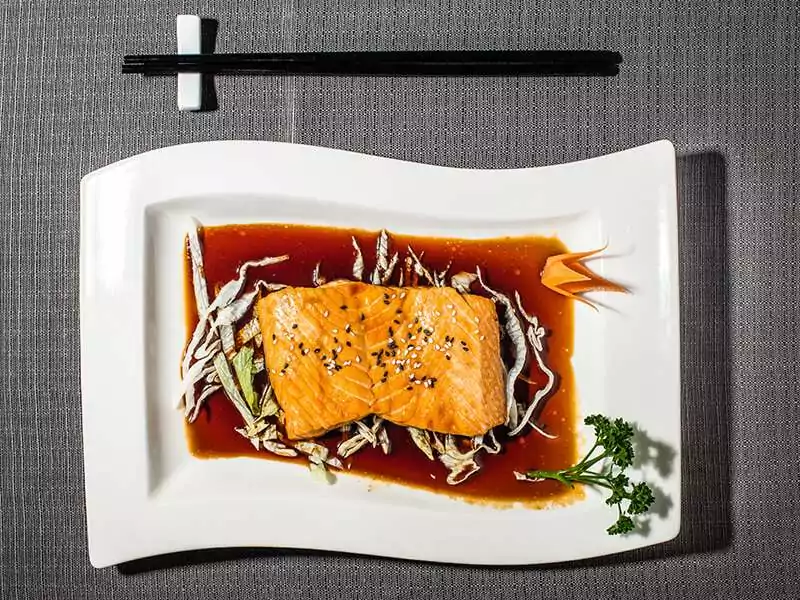
It’d be essential if you know a tamari sauce substitute to have a backup plan when you cannot purchase it. It will take too much time to find an excellent replacement, but you can receive a good result from it.
This article will prevent your recipes from discarding if you run out of tamari sauce. The information about the taste, texture, and others will be explicitly provided. I am happy to introduce to you all this knowledge, so you can apply the following substitutes effectively.
Highlight Properties Of Tamari Sauce
Tamari is a traditional variation of soy sauce. You can find it in the Chubu area of Japan (1). Tamari shoyu is another common name for it. Soybeans are fermented with salt and water to form tamari sauce.
Unlike other soy sauces, tamari sauce does not contain wheat. Its texture is denser than other types of soy sauce. The color of tamari sauce is darker as well, and its flavor is pretty intense.
Its rich umami flavor is an excellent addition to dishes. Moreover, you will feel the taste of soybeans when enjoying the dish with tamari sauce. Salty taste and gentle sweetness are essential things of tamari sauce.
Like other soy sauces, tamari sauce is a favorite dipping sauce with sushi because of its harmonious taste. Add a little spice to the tamari sauce to have an incredible meat and seafood marinade.
Besides, it is used pretty commonly in vegetable dishes to add flavor to them. The recipes containing tamari sauce have a rich and attractive flavor.
Watch this video to know more:
Fill The Material Handbook With 16 Substitutes
If you are on a tight budget in cooking ingredients, you should add the following 16 fantastic alternatives to tamari sauce. These replacements will help diversify the flavors and create innovation when cooking.
1. Fish Sauce – Rich Umami Flavor Components
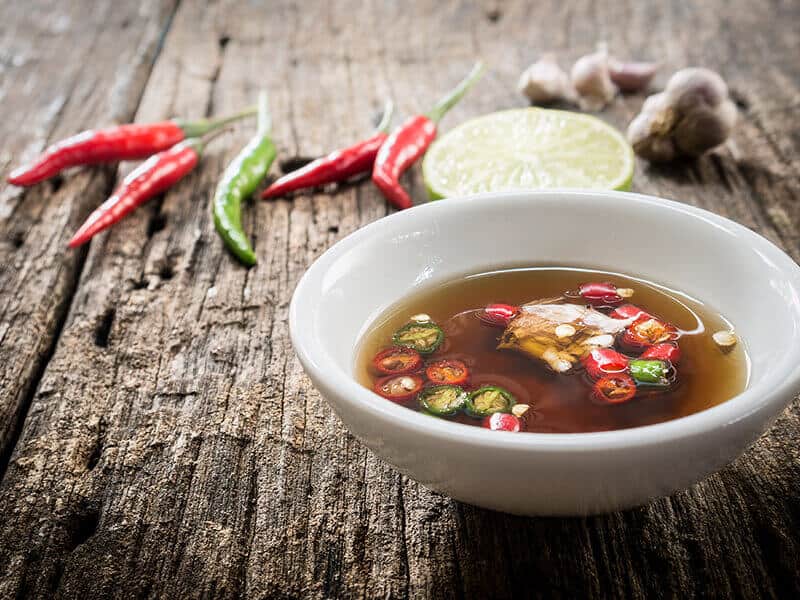
An alternative to tamari sauce that is pretty famous in Asian countries is fish sauce. After going through a fermentation process, the fish will form drops of delicious, rich fish sauce and attractive colors.
The dishes will be supplemented with characteristic earthy and umami tastes. Salty and tangy flavors are typical characteristics when referring to fish sauce. You can also feel the pungent taste of the fish sauce. The taste of the fish sauce is more intense than tamari.
Fish sauce will perfectly substitute for tamari in stews, stir-fries, salads, and meat marinated dishes. You need about half a teaspoon of fish sauce to replace 1 teaspoon of tamari sauce. You should add some garlic to make the taste more similar.
2. Coconut Aminos – Soy-Free Substitute
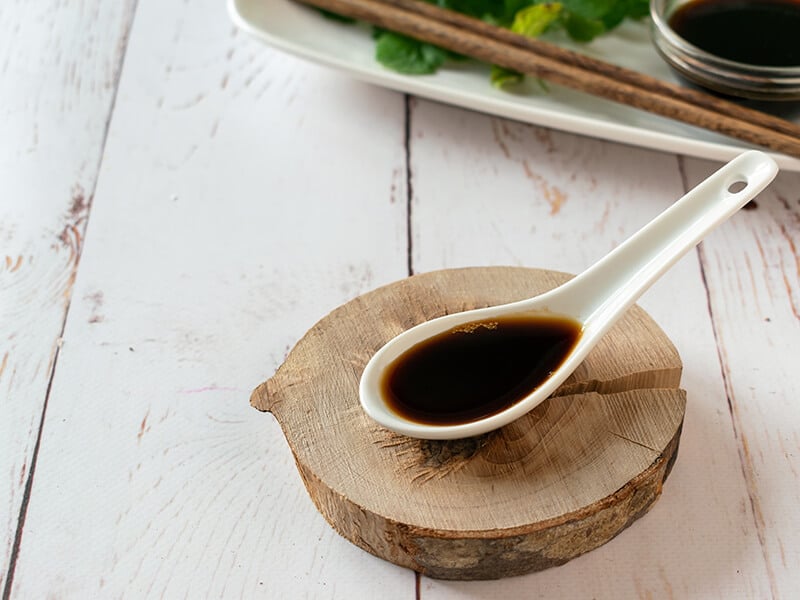
I must mention coconut aminos in this list. It will bring a tamari sauce-like flavor to the recipe. The core components of coconut aminos are salt and coconut-blossom nectar. This alternative does not contain soy sauce.
The texture of coconut aminos is not thick, and the flavor is less salty than tamari. It will add umami flavor and a hint of sweetness to the dish. If you want to increase the salty taste of it, you can add a bit of salt.
I love to eat stews, soups, salad dressings with the rich flavor of coconut aminos. Use it in vegetable dishes, noodles. It tastes great when paired with elements that have a tangy and citrus taste. An equal ratio is a perfect alternative.
Learn some knowledge about the taste and uses of coconut aminos. Watch this video to know more:
3. Worcestershire Sauce – Diverse Flavor Alternative
Caption: You should not use Worcestershire sauce if you are a vegetarian.
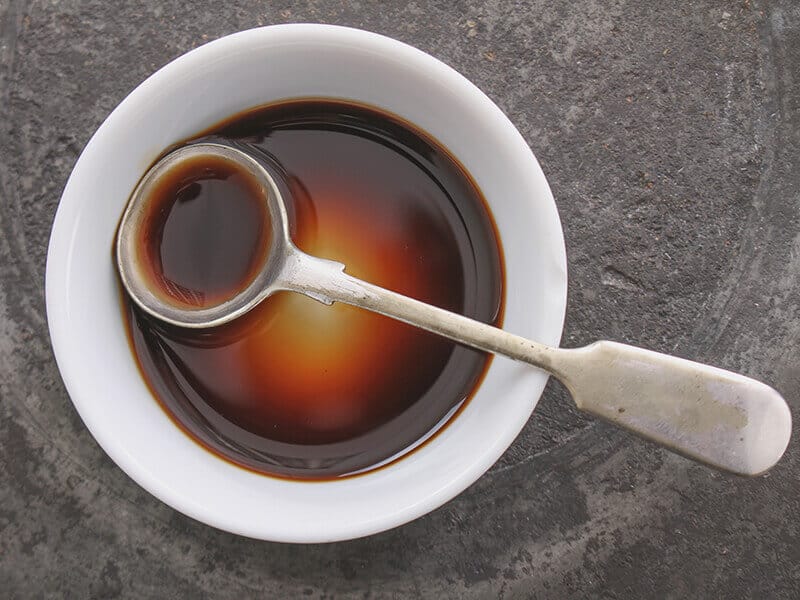
In case you need to add umami flavor to the dish, you must buy Worcestershire sauce now. Worcestershire sauce will bring the taste and feel of tamari sauce to your dishes. Worcestershire is not for vegetarians.
Besides the umami, it also offers a bit of sweetness mixed with a mild salty taste. Moreover, its tangy and earthy taste will make you think of vinegar and molasses. The texture of Worcestershire sauce is lighter than tamari sauce.
The rich flavor of Worcestershire sauce will enhance the flavor of baked goods, grillings, stews, fried dishes, soups, poultry, and salads. Add more flavor and aroma to vegetable dishes by using Worcestershire sauce.
4. Soy Sauce – The Best Option For You
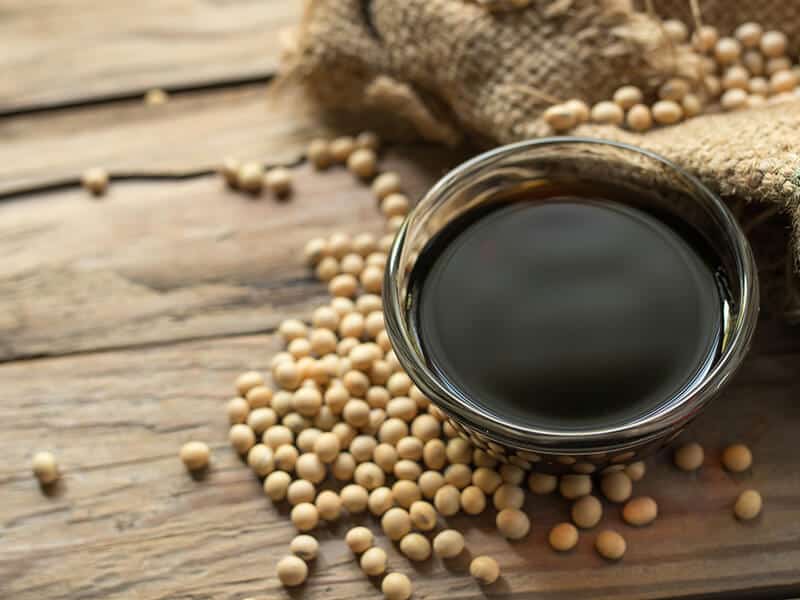
Soy sauce is the best and easiest-to-find alternative to tamari sauce. If you like components made from soybeans, you should prioritize soy sauce. This alternative offers a taste and texture that is not too different from tamari.
The soy sauce taste is a harmonious combination of sweet, salty, bitter, and a bit of sour taste. It is difficult to confuse the aroma of soy sauce with any other dipping sauce. The umami taste and texture of dark soy sauce are the most similar to tamari sauce.
1 part soy sauce makes a perfect substitute for 1 part tamari sauce in sauteed and stews. The representation of a cup of soy sauce for dipping on the banquet table is standard. Meat and fish recipes are more delicious and richer when marinated with soy sauce.
5. Oyster Sauce – Add Seafood Taste To The Recipe
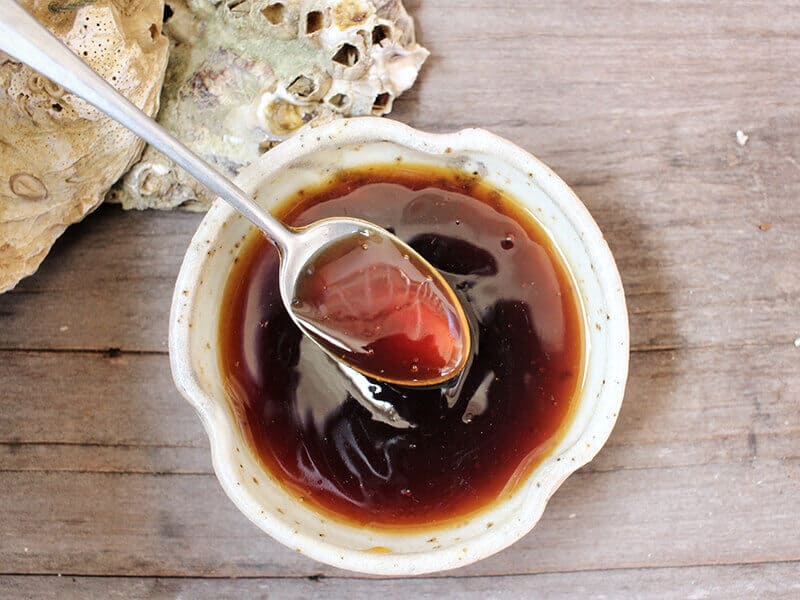
If you need a change to bring seafood flavor to your meal, you should add oyster sauce to the recipes. Oyster sauce is like a second version of tamari sauce. It has a color and taste pretty similar to tamari. The main element that makes oyster sauces is oyster juice.
Oyster sauce has a strong umami taste. In addition, you will quickly feel salty, earthy, and a bit of a sweet taste. The sweetness of the oyster sauce is more robust than tamari sauce. The texture of tamari sauce is lighter than oyster sauce.
Enhance the quality and flavor of stir-fries, vegetables, and salads with oyster sauce. It is an essential ingredient in seasoning foods. You can combine it with noodles and different meats as well.
Watch this video to know more:
6. Anchovies – An Essential Element Of Worcestershire Sauce
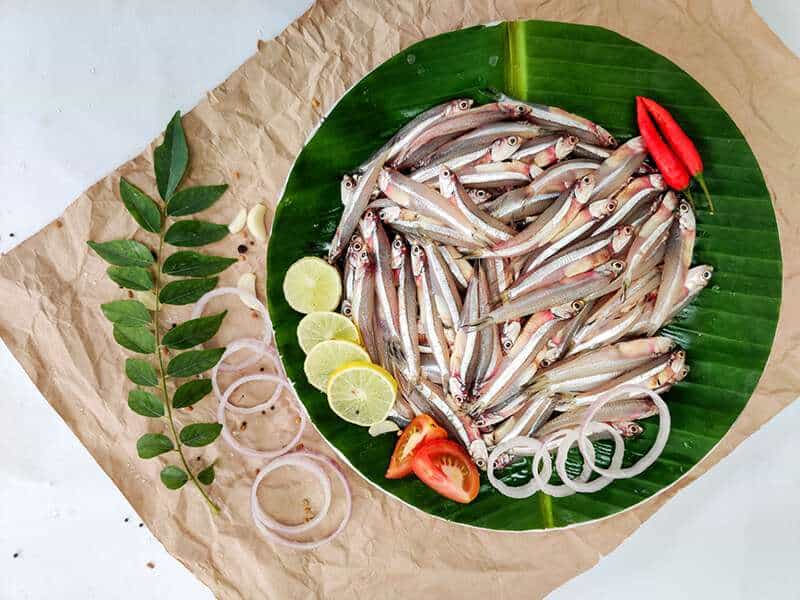
The dish will be supplemented with umami, tangy, and savory flavors with the appearance of anchovies. The flavor of anchovies will ensure the quality of the dish when replacing tamari sauce. However, the plate will not get the sweet taste when using anchovies.
Anchovies are the product of the fermentation of fish and brine. This is a widely used material in many places of the world. Especially anchovies are an essential ingredient of making Worcestershire sauce.
There are different uses of anchovies. You can use chopped anchovies in salads, vegetables, and casserole. It also works well in stir-fries and curries. You should use a small amount of anchovies first and increase if you are not satisfied.
7. Salt – The Most Convenient Substitute

Salt is a quick and convenient replacement for tamari sauce because it is readily available in every kitchen. Salt contains a high amount of sodium chloride (2). This is a superior alternative, although it does not give the dish the same umami flavor as tamari sauce.
However, do not worry. Its taste is pretty simple and does not affect the flavor of other ingredients in the recipes. If you just need to add a salty taste, salt is the most straightforward choice.
Salt is a spice that appears in every dish. You can add more flavor to the plate by sprinkling a bit of salt on the surface of the dish. You can also season meat and seafood with salt or add to sauces. Sprinkle a little salt when stir-frying to make the flavor more intense.
8. Balsamic Vinegar – Best Choice For Salad Dressings
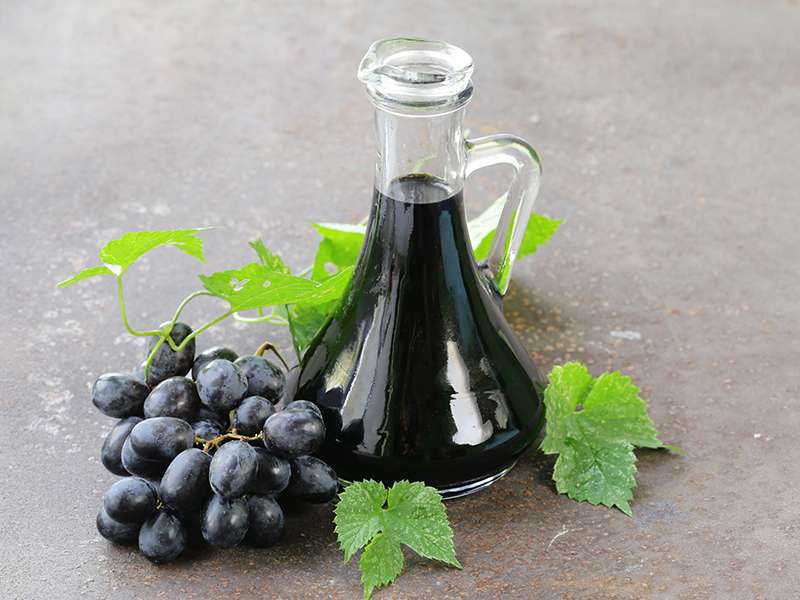
You can use balsamic vinegar instead of tamari sauce when you do not have it on hand. If you want to experience a different flavor, balsamic vinegar will become a fantastic replacement. It will help upgrade the quality and flavor of the recipes.
The sourness is a distinctive flavor when mentioning balsamic vinegar. Furthermore, the salty and tangy flavors are unique features of balsamic vinegar. To decrease the sourness of balsamic vinegar, I recommend adding a little sugar or honey.
It will pair well with a lot of various recipes. Its flavor and texture are suitable for making salad dressings. You can mix balsamic vinegar with vegetable, fish, and meat plates to create new beautiful flavors. It is a big mistake if you use balsamic vinegar as a dipping.
9. White Soy Sauce Shiro – A Variation Of Soy Sauce
In case you need a backup for tamari sauce without worrying too much about the color similarity, you should consider white soy sauce Shiro as an appropriate choice. The unique feature of this soy sauce is that it only contains about 10% soybeans.
Your dish will have a new color with white soy sauce Shiro. Similar to tamari sauce, white soy sauce Shiro has a rich umami flavor and characteristic sweetness. Alternatively, the affluent, salty taste will also help diversify the flavors of the dishes.
White soy sauce Shiro is commonly used when making salad dressings. Besides, savory cakes, omelets, broths, and meat plates are indispensable with white soy sauce Shiro, but you need to add white soy sauce at the final stage of the cooking process.
10. Liquid Aminos – Another Product From Coconut
Another alternative product made from coconut is liquid aminos. Coconut sap will undergo a fermentation process along with salt and fermented soybeans. Its saltiness pretty resembles the taste of soy sauces.
Liquid aminos will bring a light flavor to your dishes—diverse food flavors with a little bit of saltiness and sweetness. The different flavors of liquid aminos blend together to create a perfectly balanced feeling.
The mild and neutral flavor of liquid aminos is an advantage that makes it possible to combine well with many different culinary styles. From salads, soups, stews, noodles, beans, and stir-fries to a marinade, liquid aminos work wonders.
11. The Light Soy Usukuchi – Reduce The Saltiness With Usukuchi
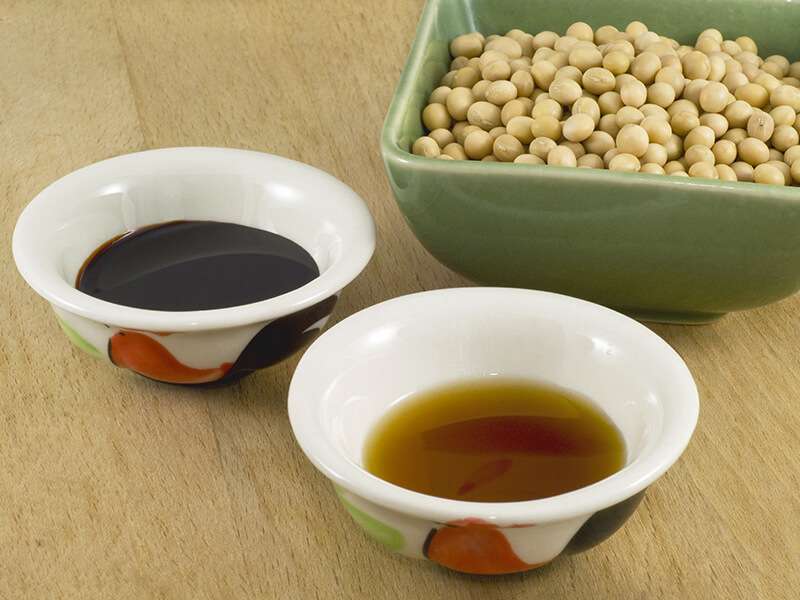
You should use another version of soy sauce instead of tamari sauce. Usukuchi has a different color from tamari sauce, with a pale yellow color. This is a famous sauce in Japan. This replacement sauce is made from the fermentation of soybeans and salt.
The taste of Usukuchi is pretty mild and less salty than tamari, with a salt content of about 18.9 percent. It has a distinctive umami flavor but is not too strong. In addition, you will discover a bit of the sweetness of Usukuchi.
On Japanese sushi tables, there is always a cup of Usukuchi shoyu dipping sauce. Furthermore, you can use it instead of tamari sauce in soups, stir-fries, simmered dishes, and marinated meat or seafood.
12. Miso Paste – Different Texture Replacement
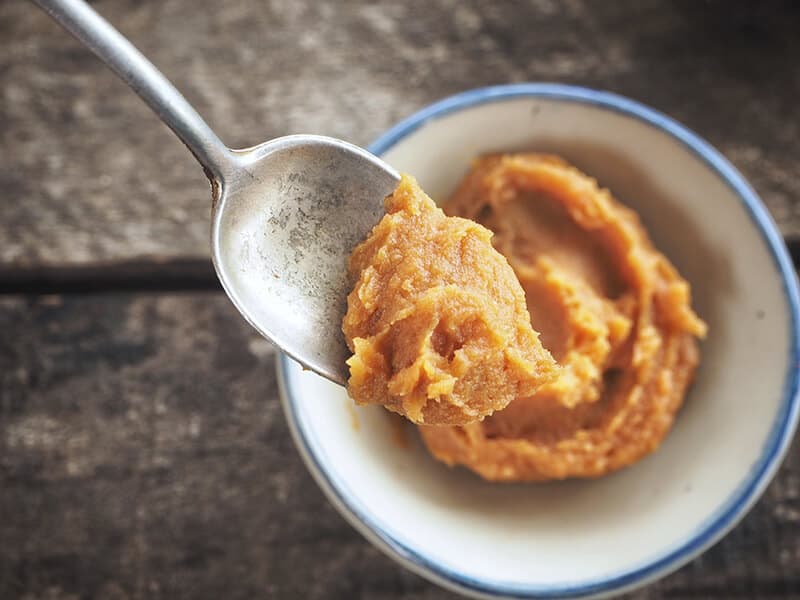
A replacement that has an entirely different color and texture to tamari sauce is miso paste. It is not a sauce, but it gives a tamari-like taste when added to soups, noodles, ramen, stews, salad dressings, marinated dishes, and broths.
If you are concerned about miso paste texture, you can add a little water in a 2:1 ratio to substitute for 1 tablespoon tamari. Miso paste has a characteristic flavor with saltiness, tangy taste, and a bit of sweetness. Different types of miso paste have a variety of flavors.
The salty taste of red miso paste is quite strong, while white miso paste is milder. You can mix them together to create a new paste flavor mix. The flavor of the miso paste pairs well with the earthy tastes of the nuts.
Watch this video to know more:
13. Dark Soy Koikuchi – Best-Selling Alternative
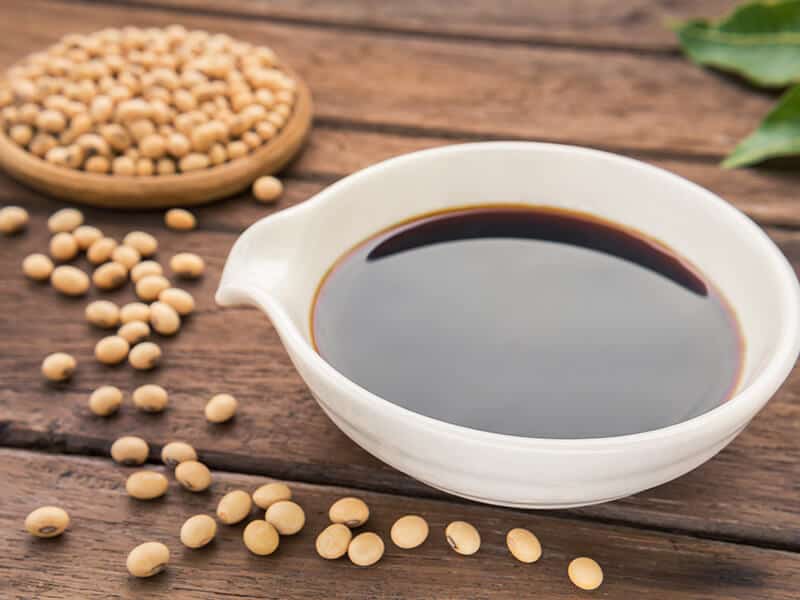
Japan is famous for its amazing sauces, and Koikuchi is one of them. Koikuchi has received the Japanese Agriculture System (JAS) certification for quality. This sauce is made from soybeans and wheat.
The distinctive reddish-brown color and rich umami flavor make a perfect substitute for tamari sauce. The gentle sweetness of Koikuchi will create a balanced feeling when enjoying. Its fragrance will also explode your sense of smell.
Koikuchi is popular in Japan when it accounts for about 80% of the market share in the soy sauce sector. Typically, Koikuchi will be served as a dipping sauce and combined with a hot pot.
14. Hoisin Sauce – Perfect Accompanied Sauce At BBQ Party

Thanks to the main ingredient being fermented soybeans, hoisin sauce has become a favorite alternative to tamari sauce. This sauce with a dense texture is famous at BBQ parties. There are various types of hoisin sauce available in the market.
In addition to soybeans, they also contain rice, seasonings like garlic or red peppers, and rice. The taste of hoisin sauce is pretty salty and rich. Its flavor is more potent and saltier than tamari sauce.
Furthermore, a hint of sweetness will add a highlight to the hoisin sauce. In particular, it is impossible not to mention the outstanding umami flavor. You can marinate meat with hoisin or process poultry and fish dishes with hoisin.
Watch this video to know more:
15. Saishikomi – A Type Of Soy Sauce With Double Fermentation
You can use saishikomi instead of tamari sauce in sashimi or sushi parties. Saishikomi is another variation of soy sauce. Like tamari sauce, it is made from soybeans and wheat, and it has the characteristic umami flavor of soy sauces as well.
However, the taste of saishikomi is not as strong and rich as tamari sauce. Its salty taste is milder than tamari sauce because of its low salt content. Alternatively, you are able to find gluten in the components of saishikomi.
The texture of saishikomi is pretty dense and is used in a variety of methods. Accompanying sauces, seasonings for marinating, and adding to dishes are typical options that you can apply.
16. Umeboshi Vinegar – Rarely Used Substitute
If you cannot eat soy-flavored dishes, you can use umeboshi vinegar instead. This substitute is rarely used, but the effect it brings is quite good. It cannot bring out a tamari-like umami flavor to the dish.
Characteristic salty, sour, tart and a bit of fruity flavor are something you will easily find in umeboshi vinegar. There are many recipes where you can use umeboshi vinegar as a substitute for tamari sauce.
You should not use too much umeboshi vinegar because its salty taste is much stronger than tamari. Use a small amount of umeboshi vinegar to make salad dressings, add flavor to stir-fries, fish dishes, or vegetables.
FAQs
Side questions related to this topic will add new knowledge for you. I have helped you answer common questions about tamari sauce substitutes below.
How To Use Alternatives Effectively?
Tamari sauce alternatives are your saviors. They come in handy when you do not have tamari sauce on hand. Besides saving food, they also bring wonderful new experiences to you. Let me know the flavor of the dishes with substitutes in the comments.
I always want to bring new ingredients with the most perfect taste to you. If you want to learn more, please like and share this article to inspire me. Thanks for your time!
References
- En.wikipedia.org.. Soy sauce – Wikipedia. [online] Available at: https://en.wikipedia.org/wiki/Soy_sauce#Japanese.
- Salt – Wikipedia. (2021). Retrieved 18 October, from https://en.wikipedia.org/wiki/Salt.

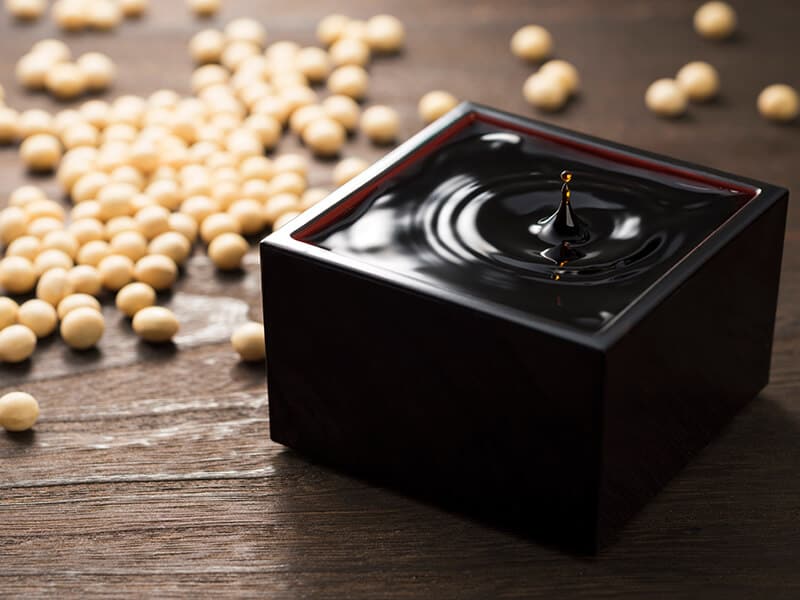





Amanda Collins
Founder and Senior Culinary Editor
Expertise
Culinary Arts and Management, Food Journalism and Critique, Recipe Development and Testing, Global Culinary Traditions, Sustainable Food Practices
Education
Institute of Culinary Education (ICE), New York, NY
Program: Diploma in Culinary Arts
Focus: Intensive hands-on training in culinary techniques, recipe development, and kitchen management, preparing students for professional roles in the culinary industry.
Monroe College, New Rochelle, NY
Program: Associate in Applied Science in Culinary Arts
Focus: Practical culinary skills, including cooking techniques, menu planning, and kitchen operations, with an emphasis on hands-on experience and industry standards.
Amanda Collins is a seasoned chef and food editor with a deep love for global flavors. Trained at the Institute of Culinary Education and Monroe College, and with over 15 years in the culinary field, Amanda has refined her skills in kitchens worldwide. Her background in food studies gives her a unique ability to share both recipes and the cultural stories that shape them.
As senior culinary editor at thebreslin.com, Amanda’s work brings authentic dishes to life, inviting readers to explore new flavors and techniques from around the globe. Her approachable style makes it easy for anyone to bring a bit of the world’s cuisine into their kitchen.